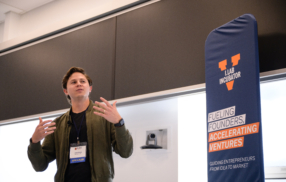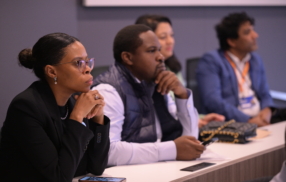

Q&A: UVA Darden Alum Carlos Bortoni Will Help Students and Alumni Break Into Tech
By Gosia Glinska
As the senior director of global tech strategy, at the UVA Darden Batten Institute for Entrepreneurship, Innovation and Technology, Carlos Bortoni (MBA ’19 and M.Ed. ‘19) will take the helm of the Tech Hub, a newly launched cross-departmental effort to advance Darden’s presence and standing in technology. Before taking on his new role, Bortoni led Qualtrics’ global education practice, overseeing the strategic direction of the business and helping thousands of K12, higher education and public sector clients around the world better understand the experiences of students, parents, faculty and staff.
Joining Darden as the School is expanding its footprint in Washington, D.C., Bortoni recently spoke with us about his vision for the Tech Hub, which will be strategically placed to better serve the needs of prospective and current students, alumni, faculty and staff within an evolving tech landscape.
Darden Report: As the new director of the Darden Tech Hub, what excites you about your role?
Bortoni: We are at this point in time where tech is everywhere, transforming almost every function in every industry, so the way we think about tech needs to change. We should be asking, how can our students continue to be effective leveraging technology, spearheading innovation and driving that change across all industries where tech continues to evolve? How can they make a difference in society at large?
As a Darden alum, I know that Darden has been on the forefront of the tech space in a number of ways, from the thought leadership coming from our faculty to the amazing relationships we have with startups, tech companies and other employers. So being that voice, that connector across our different stakeholders within the broader tech ecosystem is exciting during this transformative time.
What are the ingredients of a successful tech hub?
For Darden, a key ingredient of success is creating a defined point of view from a thought leadership standpoint. It means combining all different voices from our faculty and staff around what’s cutting edge in technology—how AI is transforming a given industry, how technology is changing the pace of innovation and so forth – and providing an actionable framework that connects theory to practice in the workplace.
A tech hub is also about providing space, both physical and virtual, where our prospective and current students, our alumni, our employers and the broader ecosystem can coalesce around all things tech. So how can we provide a unified experience that has an impact in a way that is both strategic and programmatic, meaning long-term vision, but also tactical, meaning being able to meet the needs of our different stakeholders—all that is important.
This long-term vision will also require us to be nimble and flexible at the same time. The pace of innovation is so fast that being able to incorporate those learnings from industry, from our alumni, into what’s going on in tech and then accelerating that feedback loop will be particularly relevant when we try to create and scale this vision for the tech hub at Darden. Our alumni know that learning doesn’t stop when you get an MBA, and the tech hub can play a pivotal role in their continuous education.
How important is it for Darden to have a tech hub in DC?
In addition to a full-time MBA, Darden has large and growing executive and part-time MBA programs in DC. The DC metro area also has an active tech and startup ecosystem, so building a tech hub that connects Charlottesville and DC makes perfect sense. Many broader conversations around technology—coming from both the public sector and industry—are happening here, and it’s important to ensure that the Darden point of view is part of those conversations.
Having a foot in DC also gives us an opportunity to create meaningful connections for our alumni and other stakeholders. For example, there’s a predictive healthcare hub in Baltimore and there’s growing focus on pharma in Virginia. So being able to localize those initiatives geographically, but also align them with the talent pool that’s coming out of those regions and then creating opportunities for students and alumni—that’s what the Darden Tech Hub will be able to do.
What is your vision for the Darden Tech Hub?
When we talk about tech, we have to understand how the landscape has changed. You may work at a tech company but you may not be a programmer—you may have a finance or marketing role. Or you may work at a large bank and be the product manager for one of their digital products. So the way we talk about tech continues to evolve, in great part thanks to how the industry and industry intersections have changed over time.
The key part of the vision for tech hub is, how do we have a broader conversation around technology in a way that is more attuned to how Darden students and professionals continuously develop their own and their coworkers’ digital literacy, and how they are prepared to lead the charge for developing and deploying current and emerging technologies more effectively. And a big part of creating and scaling the Darden Tech Hub is bringing in the various pieces of the Darden ecosystem – academics, extracurriculars, professional development opportunities and events – as a way to help our students develop and deploy a toolkit that is meaningful and impactful in the classroom, in their internships and the careers they end up pursuing.
Let’s turn to artificial intelligence. Regarding AI’s proliferation in business, what will you be paying attention to?
While AI and ML are not new technologies, they certainly went mainstream and viral almost overnight. It’s hard to understand the full scope and speed of AI’s transformational potential, and we will continue to see some interesting trends across various industries. What is important to remember is that business schools such as Darden have a key role to play in shaping our understanding of how AI will transform industry and society in a way that is ethical and scientifically rigorous.
Next, how do we combine that theory with practice? How do we understand the impact of AI and other technologies when we deploy them across different business functions, different tasks, different industries? How do we do that in a way that is impactful and measurable but also ethical?
We are trying to adapt really quickly and keep pace with the rate of innovation, and that’s a unique place where tech hub as a space, and Dardan and UVA as an ecosystem, can help define some of those rules of engagement based on the research, based on the practice and based on some of these ethical guidelines. And that’s an exciting opportunity.
How did Darden prepare you for your new role?
Darden does an exceptional job at teaching students how to identify opportunities and how to leverage the right tools and resources to capitalize on those opportunities. Darden has taught me that you need to have a process and a structured way of thinking to help you identify those opportunities, but more importantly, to help you share your vision with others and get buy-in. So the case method, classroom discussions and the extracurricular experiences like the i.Lab Incubator at Batten are all parts of the toolkit to help you understand: What is the problem? How do I communicate that effectively to team members, leaders, internal and external stakeholders? And how do we agree on a process to fix this? Darden teaches that exceptionally well.
Part of my role is helping our students and alumni to make that journey into tech, whether they have a tech background or not, whether they are young professionals or established executives. I would not be able to take on this role without my Darden training, my consultant training and my experience leading a global team at Qualtrics.
Darden also encouraged us to make a difference not only in the workplace, but also in society at large, and that really spoke to me. I see the tech hub as an important channel for us to connect, because we can make the most difference by working together. I’m very excited to work not only with a broader UVA community, but also with the broader tech community. So let’s connect, let’s engage and let’s find ways to scale our impact together.
The University of Virginia Darden School of Business prepares responsible global leaders through unparalleled transformational learning experiences. Darden’s graduate degree programs (Full-Time MBA, Part-Time MBA, Executive MBA, MSBA and Ph.D.) and Executive Education & Lifelong Learning programs offered by the Darden School Foundation set the stage for a lifetime of career advancement and impact. Darden’s top-ranked faculty, renowned for teaching excellence, inspires and shapes modern business leadership worldwide through research, thought leadership and business publishing. Darden has Grounds in Charlottesville, Virginia, and the Washington, D.C., area and a global community that includes 20,000 alumni in 90 countries. Darden was established in 1955 at the University of Virginia, a top public university founded by Thomas Jefferson in 1819 in Charlottesville, Virginia.
Press Contact
Molly Mitchell
Senior Associate Director, Editorial and Media Relations
Darden School of Business
University of Virginia
MitchellM@darden.virginia.edu



